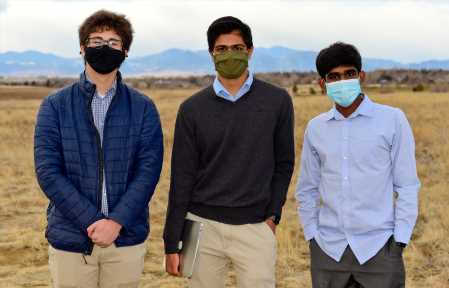Through the coronavirus pandemic, three high school students quickly realized how isolated some of their peers were, which in many cases led to drug use to cope. So they set out to create an app that educates others on how the brain works, and how illnesses and common drugs impact it.
Legacy High School students Krupa Subramaniam and Kai Hoshijo and Peak to Peak Charter School student Koki Gunasinghe created the app, braiNformation, which won the 2nd District Congressional App Challenge from U.S. Rep. Joe Neguse, D-Lafayette.
Gunasinghe said in a video the three hope to promote drug and depression awareness “by detailing the symptoms of depression and the effects of common drugs.”
“Especially after the many suicides in Adams 12 Five Star School District, we wanted to educate students about depression warning signs through the unorthodox, yet effective means, such as an app,” he added.
When the app opens, there’s a neuroscience fact that updates weekly. There’s a “brain” tab with a 3D model of the brain, color-coded with the different parts of the brain. Users can learn about the functions of each part of the brain, as well as what happens if that part is damaged.
“We wanted to give a 3D model for those who learn visually,” Hoshijo said in the video. “We can also see it at different angles, as well as providing color codes so that you can memorize a brain function with a color.”
The app outlines five illnesses from which the brain can suffer, including depression, under the “disease” tab. The “drugs” tabs outlines six drugs and narcotics that can hurt the brain.
“For depression, we decided to include statistics on the types of depression, risk factors and psychological and physical symptoms,” Gunasinge said. “We included this information so that if a student notices these symptoms, they can seek action more quickly and potentially save a life.”
Subramaniam said he hopes the app creates a better society.
“What we really wanted to do was not just discourage drug abuse blindly, but really get into the specifics, especially the scientific specifics of why people are not supposed to do these types of drugs,” he said in the video. “BraiNformation was really created to educate today’s youth on the main issues that are affecting our society and give more information about brain science as a whole.”
Neguse said in a news release he was inspired by the app.
“I was incredibly inspired by the innovation and creativity displayed in this year’s submissions to the Congressional App Challenge,” he said. “This year’s winners not only displayed their talented coding skills, but really focused on an issue that is influencing young people in our society and developed an app that will provide tools and education to address drug addiction and mental illness.”
Subramaniam, Hoshijo and Gunasinghe felt the app was especially important now, with virtual classes and limited opportunities to socialize. They hope braiNformation can prevent their peers and others from damaging their brains and recognizing what drugs can do to them.
BraiNformation is a free app available in the App Store and Google Play.
Source: Read Full Article
